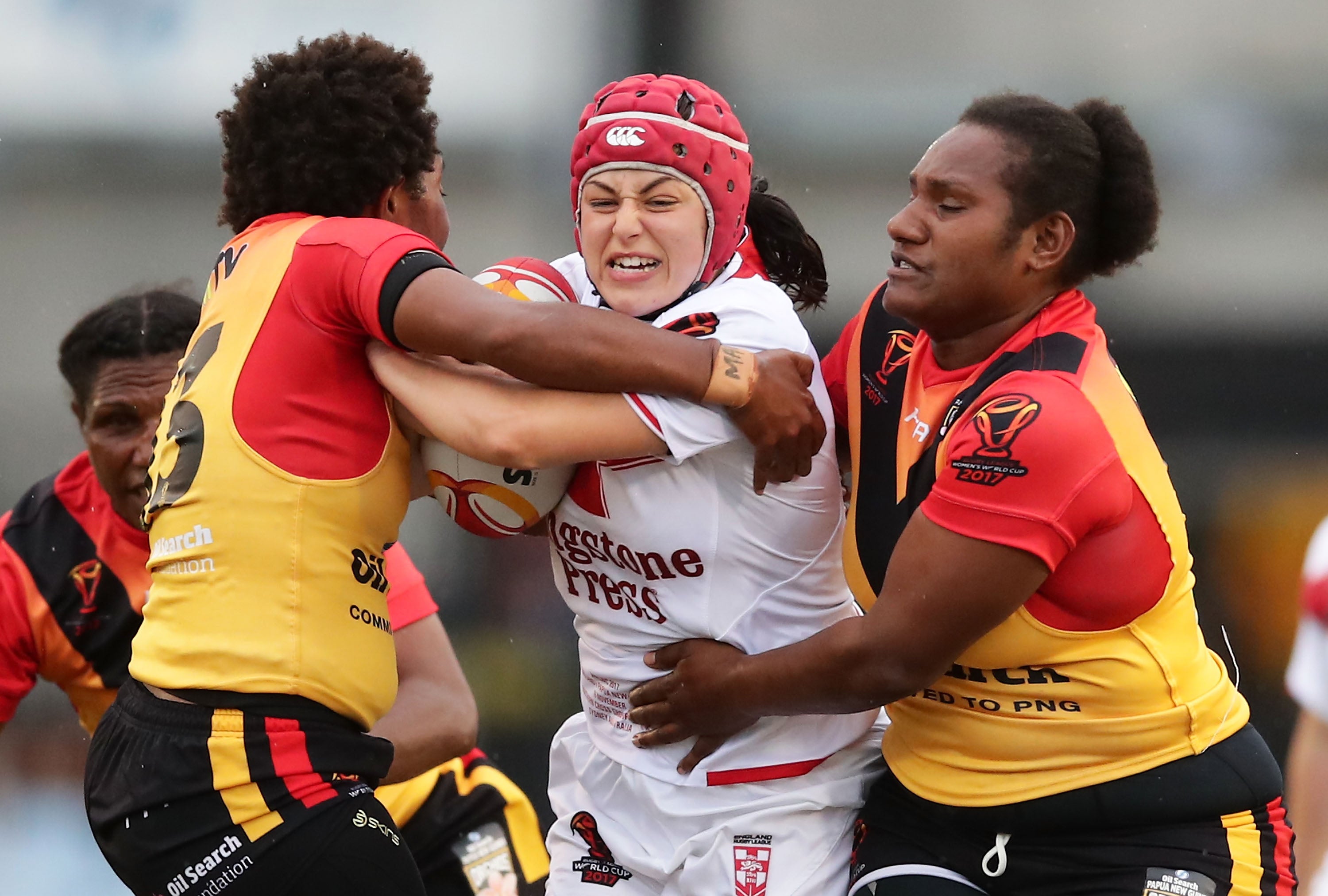The rugby-playing teacher who wants her sport to reward its women
Emily Rudge is the captain of her country but like most in the Women’s Super League she has a full-time job. In a rapidly-growing sport she hopes that will soon change

When your PE teacher is an England international you’re bound to learn some unique lessons about the underbelly of elite spot.
For years, no one at Rainford High in St Helens knew Ms Rudge was Emily Rudge, captain of the country’s women’s rugby league squad and back rower for local side Saints.
Everything changed in 2017, when the new RFL Women’s Super League - sponsored by Betfred since 2019 - debuted, and rumours started swirling that the woman with the whistle was something special.
“Nobody really had a clue!” said the World Cup veteran, whose team is set to take on York City Knights in the Challenge Cup final on Saturday.
“I was just a teacher. It was funny, we actually went to a tournament as the season just started. And a lot of the kids didn’t know by then, and two of my teammates were at this tournament in the Saints game, and they were like, ‘Oh my god, Miss! Are they St Helens players?’ And I was thinking, I play every week with these girls.
“But over the last three years, as the Super League has grown, it’s lovely that now the kids are well aware of it. They see it on social media, and I come in on a Monday, and they’re like, Miss, great win at the weekend, I see that you scored’ or whatever, and they’ll talk about it with me, which is great.’”
Sometimes the conversation stems beyond in-game action, allowing the athlete an opportunity to teach her pupils one major difference about playing elite sport as a woman.
Rudge said: “Younger people are starting to take an interest in the women’s game as well, boys and girls. A lot of them are like, ‘I don’t understand why you work here?’ They’re like, ‘Why do you work at this school when you play for Saints?’ And I obviously explain to them, well, I play for Saints but I don’t get paid.”
Most women in the Super League work full-time jobs. Rudge’s Saints and England teammate Amy Hardcastle is an NHS worker who spent the past year on the frontline in Calderdale Royal Hospital’s A&E.
Some of the other women likely to represent England at this autumn’s home World Cup include Castleford Tigers carer Shona Hoyle, Rhinos’ Army Royal Artillerywoman Abigail Eatock and several students.
The impromptu sport finance lesson shocked Rudge’s teen charges, many of whom assumed she banked a similar salary to her male counterparts in the men’s Super League, where teams are capped at £2.1 million.
She said: “I think the kids just automatically assume you play for Saints, you get paid like the men. They don’t see any difference. They don’t understand why it is different, so you really do have to explain it to them.
“A lot of them think, ‘oh, Miss, you must be loaded. You play for Saints, you’re a teacher, you must have so much money.’ I keep thinking, I wish. But hopefully I won’t have to keep explaining that in the future, as the sport grows. And if it does make it to semi-professional, then those conversations hopefully will be a little bit easier.”

Rugby union’s Red Roses were awarded full-time central contracts for the first time in 2019, and the salary cap in the top-flight Allianz Premier 15s will increase to £120,000 next season.
Rudge fell in love with the hard physicality and toughness of rugby league as a youngster, finding the sport made her “feel strong and powerful”.
The skipper, who led England during the 2019 Rugby League World Cup 9s in Australia, hopes autumn’s hot-ticket World Cup will further accelerate discussions around pay in the rapidly-growing women’s code.
In April, the Rugby Football League announced the launch of a second tournament, the Women’s Super League South, which will involve teams from union-mad cities like London and Cardiff.
Rudge said: “Having some success in the World Cup I think will definitely take it to another level anyway. I think there’s talks, hopefully in the next couple of years, of starting to make the sport semi-professional.
“I think that will definitely help allow the women to train with more time, will only make the sport more competitive, will help people to want to be part of the sport.
“At the minute I think a lot of the young girls who are at that age where they can choose between rugby union and rugby league, they go into union because they’re thinking, ‘I can make a career out of being a rugby union player, I can’t do that playing rugby league.’
“So we’re losing girls to that sport which is such a shame. I think if rugby league can get to that same level, we’ll see a lot more girls want to stick with the sport and we’ll grow it from there.”
It’s not a lecture, exactly, so much as a reminder of Rudge’s perfectly sensible core curriculum: A-level talent requires investment.
Join our commenting forum
Join thought-provoking conversations, follow other Independent readers and see their replies
Comments